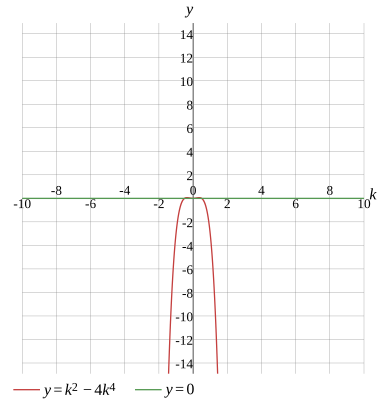Question
Solve the equation
k1=−21,k2=0,k3=21
Alternative Form
k1=−0.5,k2=0,k3=0.5
Evaluate
k2−4k4=0
Factor the expression
k2(1−4k2)=0
Separate the equation into 2 possible cases
k2=01−4k2=0
The only way a power can be 0 is when the base equals 0
k=01−4k2=0
Solve the equation
More Steps


Evaluate
1−4k2=0
Move the constant to the right-hand side and change its sign
−4k2=0−1
Removing 0 doesn't change the value,so remove it from the expression
−4k2=−1
Change the signs on both sides of the equation
4k2=1
Divide both sides
44k2=41
Divide the numbers
k2=41
Take the root of both sides of the equation and remember to use both positive and negative roots
k=±41
Simplify the expression
More Steps


Evaluate
41
To take a root of a fraction,take the root of the numerator and denominator separately
41
Simplify the radical expression
41
Simplify the radical expression
21
k=±21
Separate the equation into 2 possible cases
k=21k=−21
k=0k=21k=−21
Solution
k1=−21,k2=0,k3=21
Alternative Form
k1=−0.5,k2=0,k3=0.5
Show Solution

Graph
